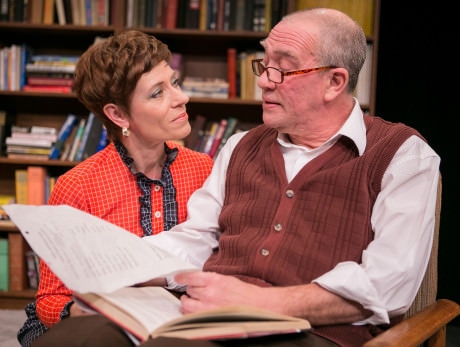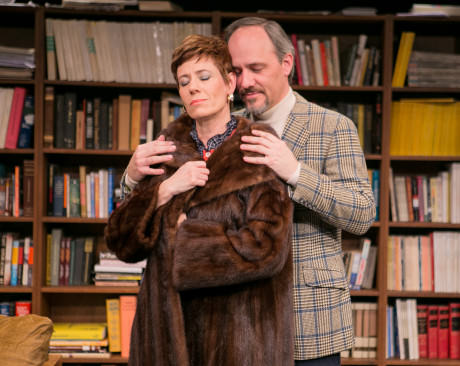You may not have heard of Terence Rattigan, British playwright whose heyday soared in the late 1940s and early 1950s; but whose more conventional fare was then swamped by the British bad boys of John Osborne and Joe Orton.
Yet, you should know Rattigan, and thanks to the Washington Stage Guild you now have the opportunity to experience one of his final plays, In Praise of Love.

You will not be disappointed. Directed by Laura Giannarelli, In Praise of Love will enthrall you with its culture clash, its complex, backstory-rich characters, and its subtext charged dialogue.
Yes, this is old school drama at its finest.
The crucial question for any revival lies in the script’s ability to remain vital and relevant with a contemporary audience. Happily, In Praise of Love answers that challenge with a resounding “YES”.
Hearkening back to London, 1973—a time of intense political machinations between Tory, Liberal, and a declining Left (that’s right, the English have long understood that Liberals are not Leftists)—the play introduces the Cruttwell family. Within this family’s layered dynamics resound the issues of the world, and they are as immediate today as they were 40 years hence: a society torn by clashing cultures, families plundered by the trauma of war and coming to grips with the pain of a dying loved one, and the never-ending need to love one another no matter what the struggle.
Patriarch Sebastian Cruttwell, played with superior curmudgeonliness by Conrad Feininger, is a difficult man to live with. Former British Intelligence Service during World War II, and now cynical in the extreme as a London literary critic, Cruttwell never has a nice word to say about anyone or anything, which could get old fast. Fortunately, as played by Feininger, his bitterness and despair at the state of English society soon become surprisingly agreeable; like a purgative, you might feel bad at the moment but soon you’ll know only relief.
The woman of the house is Lydia Cruttwell. Julie-Ann Elliott does a masterful job giving this Estonian refugee from Nazi genocide and Soviet occupation a marvelous combination of soul-wrenching memories and recurring ephemeral joy. Sick with a terminal disease, Lydia beams as this play’s center of gravity, as she does everything possible to care for the people she loves.
Sebastian’s longtime friend, Mark Walters (played by Steven Carpenter), pays the Cruttwells a visit, ostensively to see his fellow writer but secretly to visit Lydia, with whom he has been in love for many years. Carpenter’s Mark Walters, the lone American on stage, has a simplicity of persona and purpose that contrasts nicely with the psychic layering offered by Feininger and Elliott. Mark might have his own secrets, but he’s not haunted by them in nearly the same way his English counterparts are.
Finally, we have Lydia and Sebastian’s 20-year-old son, Joey Cruttwell, who wants more than anything to win the approval of his detached, unknowable father. Christopher Herring portrays the aspiring playwright honestly, and with just enough naiveté to keep him the hopeful one in a family fraught with disillusionment. It’s his idealistic belief in a world built around honesty that solidifies the play’s thematic structure.
And lying to one’s loved ones never felt so right as it does In Praise of Love.
Director Laura Giannerelli does a superb job navigating the complex emotional strands at the heart of this family drama. Not only does she keep the pacing varied but she also manages the subtext with subtlety, allowing it to flare up only momentarily, and dramatically, before it once again disappears behind façade and pretense.
The production team of set designer Carl F. Gudenius, costumes by Sigrid Jóhannesdóttir, and lighting by Marianne Meadows does a great job of establishing the Cruttwell’s home, a world dominated by literature and lack of the fashionable.
Such simple scenography allows Rattigan’s story to take center stage.
As with most Washington Stage Guild production the text dominates, and this text is as intelligent as it is fiercely dramatic and full of surprises.
As a survivor of the Nazi mass killings of the Baltic untermenschen (“subhuman” being the name Nazis gave to a whole host of people from the Slavs to the communists to the gypsies to the Jews), Lydia’s determination to live joyfully galvanizes not only her on-stage family but the audience as well. We root for her as she struggles to deal with the disease that is killing her and the memories that haunt her, and we celebrate her triumphant spirit.
Sebastian has his own indomitable will, and Feininger’s ability to reveal the vulnerability beneath his character’s years of reticence proves to be the evening’s most powerful moment. We listen spellbound as the curmudgeon bursts, if only for a few brief, memorable seconds.

There are numerous moments in this tightly woven drama, however, and each has its own particular nuance and texture. And you’ll enjoy them all, and for different reasons.
For like a fine wine that’s been aged good and proper, In Praise of Love will leave you savoring every drop.
Running Time: Two hours and 30 minutes, with one intermission.
In Praise of Love plays at plays through January 25, 2015 at the Undercroft Theatre of Mount Vernon United Methodist Church – 900 Massachusetts Avenue, NW, in Washington, DC. For more information and for tickets, call (240) 582-0050, or purchase them online.
RATING:




